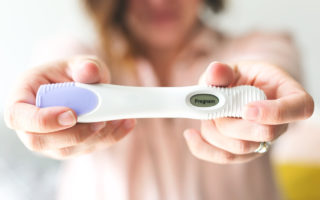Table of Contents
The condition of a 2-month-old fetus
In the 7th week of amenorrhea, the embryo measures 7 mm. Organogenesis continues with the development of all its organs: brain, stomach, intestines, liver, kidneys, and bladder.
The heart doubles in size and forms a small bulge in the abdominal cavity. The embryonic tail disappears and a spinal column is formed with vertebrae around the spinal cord.
On the face of the fetus at two months, its future sensory organs are emerging and dental buds are taking shape. The arms and legs are getting longer, the future hands and feet are taking shape, followed by fingers and toes. The primitive sexual cells also settle.
In the 9th week, the embryo moves within the amniotic envelope. These are reflex movements, visible on ultrasound, but unnoticed by a mother two months pregnant.
At the end of the second month of pregnancy, i.e. after 10 weeks of amenorrhea, the embryo weighs 11 grams and measures 3 cm. It now has a human shape with a head and limbs. The contours of all its organs are formed and its nervous system is developing. With the Doppler, we can hear the heartbeat of its body. Embryogenesis is complete: the embryo becomes a fetus in the second month of pregnancy.
In the second month of pregnancy, the belly is not yet visible, although the pregnant woman feels that she is pregnant because she has several symptoms.
Changes in the mother in the second month of pregnancy
Intense physiological changes occur in the mother’s body: blood flow increases, the growth of the uterus continues and hormonal impregnation increases. The hCG hormone, which peaks in the second month of pregnancy, causes an increase in symptoms:
- Nausea, sometimes accompanied by vomiting
- Drowsiness
- Irritability
- Firm, tender breasts, dark nipples with small areolae
- Frequent urination
- Hypersalivation
- Tightness in the lower abdomen at the beginning of pregnancy, due to the uterus that is now the size of an orange, may intensify.
Physiological changes may provoke new pregnancy symptoms:
- Constipation
- Stomach acidity
- Bloating, spasms
- Cramps, constipation, cramps
- Mild discomfort due to low blood sugar or low blood pressure
- Tingling in the hands
- Shortness of breath
Pregnancy can also be psychologically stimulating, which is not without fears and concerns for the pregnant woman, especially since the pregnancy is still fragile in the second month.
>>> KEEP READING – The benefits of prenatal yoga for pregnant women
Things to do or prepare
- Go to your first mandatory prenatal visit with your gynecologist or midwife
- During the visit, blood tests (blood group, serology for rubella, toxoplasmosis, HIV, syphilis, irregular agglutinin test) and urine tests (glycosuria and albuminuria) will be requested
- Send the declaration of pregnancy to the various organizations required
- Make an appointment for the first ultrasound (between 11 weeks and 13 weeks + 6 days of amenorrhea)
- Make a pregnancy file with all test results
- Start thinking about the place of birth
Tips
- The watchword of the second month of pregnancy is: rest. At this stage, you are still fragile, so you mustn’t overexert yourself.
- If you experience bleeding and/or severe pain or tension in the abdomen in the early stages of pregnancy, seek medical help immediately. This is not necessarily a miscarriage, but it is important to check.
- The fetus is in full organogenesis and is still very fragile at two months old. It is therefore advisable to avoid viruses, microbes, and parasites that are dangerous to it (rubella, listeriosis, toxoplasmosis, etc.).
- Self-medication should be avoided during pregnancy because some medicinal molecules can be harmful to the fetus. You should consult your pharmacist, gynecologist, or obstetrician about the treatment of symptoms during the first trimester.
- Alternative medicine is an interesting remedy for these conditions. Homeopathy is safe for the fetus, but medications should be chosen carefully to be most effective. Herbal medicines are another interesting remedy but should be used with caution. Seek expert advice.
- It is not recommended to go on a diet or to eat for two, but it is important to adopt a balanced diet. This also helps to limit certain pregnancy-related problems (constipation, nausea, hypoglycemia).
What should you eat when you are in the second month of pregnancy?
The first thing you should do in the second month of pregnancy is to hydrate properly and drink 1.5 liters of water a day. This will prevent pregnancy-related digestive problems, such as constipation, which can lead to hemorrhoids and nausea. As for the latter, an empty stomach increases the feeling of nausea.
To relieve nausea and avoid taking medications harmful to the two-month-old fetus, expectant mothers can drink ginger or chamomile tea. Abdominal pain in the second month of pregnancy is more or less frequent, depending on the woman. There are natural solutions for all these problems.
For food, it should be healthy and of good quality. The future baby needs nutrients for its proper development.
In the second month of pregnancy, folic acid (or vitamin B9) is very important for the development of the nervous system and the genetic material of the embryo. It is found mainly in green vegetables (beans, lettuce, watercress), legumes (peas, lentils, chickpeas), and some fruits such as oranges and melons.
During pregnancy, it is important to avoid deficiencies that can have serious consequences for the fetus. A doctor may prescribe a folic acid supplement to a pregnant woman if she has a deficiency. It is also often prescribed during pregnancy to ensure that the pregnant woman has enough vitamin B9 when she becomes pregnant.



